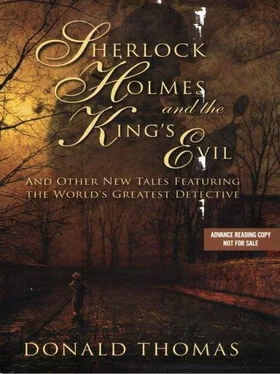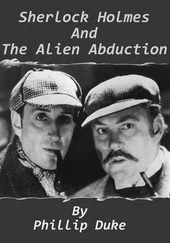After that, Sherlock Holmes was not inclined to remain in Venice “to no purpose,” as he said. It was impossible to book a wagon-lit for the next day’s Grand European Express to Calais and London. On the following day we were more fortunate. By then the fate of Augustus Howell was beyond question. His death had been attended by such drama of his own making that they had held a coroner’s inquest on him. The report in the Continental edition of The Times reported a verdict of death from natural causes.
“How are the mighty fallen!” Holmes exclaimed as he closed the pages of the newspaper. “Poor Gussie Howell! To die of natural causes after all!”
It was the evening before our departure and we were sitting at a table outside Florian’s with the sunset casting fire across the outlines of basilica and palaces. We were waiting for Pen and Fannie Browning, whom Holmes had insisted should be our guests before we left for home.
“There is something amiss in their household which I cannot quite put my finger on, Watson. It is probably the incompatibility of Puritan principles and nude female models under the same roof. I sense that the young Brownings’ marriage is ‘but for a two months voyage victualled,’ as Shakespeare puts it. I would therefore prefer to meet on neutral ground.”
That evening, under the lamplight and the soft echoes of the wavelets by the canal steps, Holmes offered his final advice in response to questions from the youthful Pen Browning.
“You have a clear course before you now. You or your attorney must let it be known that whatever manuscripts are in the hands of auctioneers or vendors, purporting to be written by your parents, have been proved fraudulent. You may call me to witness if necessary. You must make it plain that those who dabble in such things are parties to a criminal fraud, carried out solely for the purposes of deception. That will put a stop to most dealings.”
“It may not stop publication.”
Holmes set his coffee cup down and looked thoughtful.
“Unfortunately the good old-fashioned remedy of taking a horsewhip to the scoundrel who publishes falsehood in this manner has been rather at a discount for some years. Now it must be a matter of threatening in advance to bring proceedings for libel against whom it might concern.”
“But surely,” said Pen Browning quickly, “it is no longer possible to libel the dead.”
Despite the difficulty which this presented, I saw that the young man was no end pleased in “putting one over” on the Great Detective. Holmes smiled at him indulgently.
“It is quite true that, at Cardiff Assizes in 1877, the excellent Mr Justice Stephen ruled that the dead have no remedy against civil libel since they are no longer juristic personalities. Criminal libel, however, that is to say defamation so offensive as to threaten a breach of the peace, is another matter and carries with it prison sentences long enough to deter all but the most resolute liars. There is your remedy.”
It was plain that young Mr Browning’s knowledge of English law stopped far short of this. He was chastened but grateful.
“Well then, Mr Holmes, there is only one more question. I must decide whether the letters of courtship between my parents should be published or burnt. About five years ago, my father burnt almost all his letters and manuscripts. He was in London at the time, in Warwick Crescent. He brought down an old travelling box of my grandfather’s and threw papers by the handful on to the fire in the front room. I saw the whole of his correspondence with Thomas Carlyle go up in flames.”
Holmes prompted him.
“And the letters written by your parents during their courtship?”
“He could not do it. He knew that he ought to destroy them but he could not. They were kept where they still lie, in an inlaid box. Not long before he died he gave this box to me and said, There they are. Do with them as you please when I am gone.’ But what am I to do?”
“When the time is right, you must publish them,” said Holmes at once. “Not now but in five or ten years. If they are anything like the two people who wrote them, they are noble and passionate, faithful and understanding, the exchanges of lovers who would die for one another. They must not perish, for there is too little of that sort of thing in the world. Publication will smash the forgers once and for all. Such creatures of darkness cannot endure the light of the sun.”
Pen Browning looked up, as if startled by this.
“I believe you are right,” he said firmly.
The letters were published nine years later and whatever fakes or forgeries may have lingered were extinguished by their beauty. Next day Holmes and I returned to England. He would accept no fee from Angelo Fiori on behalf of Pen Browning. Instead, he asked only for the “worthless” manuscripts of Don Juan in the New World, The Venetian Nun and Savonarola to the Signoria, with a set of the false “first editions,” including the 1847 Sonnets of “E. B. B.” They were given a place in what he called his “Cabinet of Curiosities.” By an irony of time, some of the books were to become more valuable than the genuine first editions which they had claimed to pre-date.
Yet Holmes knew the difference between true gold and fool’s gold. As the express left Venice, he opened a copy of Robert Browning’s “Roman Murder Story,” The Ring and the Book, which he had picked up from a bookstall at the last moment. It so absorbed him that he sat up all night reading and closed the last page of its twelfth book about ten minutes before our train pulled into Charing Cross.
IV. The Case of Peter the Painter
On a morning in early December, three years before the Great War, Mrs Hedges brought us the unusual story of a yellow canary. By this time of the year, the branches of the great elms and beeches were bare. Beyond Clarence Gate, on my morning walk, the avenues of the Regent’s Park echoed to the scuffling of pedestrians striding through drifts of dried leaves, as if they were wading through the shallows of a holiday beach.
When the rain began that morning, at ten minutes before ten o’clock, I had just returned to our rooms, stopping only at my tobacconist for two ounces of Navy Cut. Sherlock Holmes had still been at the breakfast table in his dressing gown when I set off. Now he was rigged out in a tweed suit with a belted Norfolk jacket. As I entered the sitting-room, he drew aside a corner of the Paddington Gazette and looked at me from his arm-chair.
“You had not forgotten, Watson, that the mysterious Mrs Hedges is to call upon us at ten-thirty precisely?”
“No,” I said, a little irritably, “I had not forgotten.”
I sat down at the table in the window and began to rub the moist tobacco leaves, crumbling them into my leather pouch.
Holmes and I had reached that stage of our history when the clatter of omnibus engines in the street below had begun to eclipse the more homely beat of hooves and the grinding wheels of the hansom cabs.
“Good,” said Holmes in a tone that irritated me somewhat more, “I am glad you had not forgotten. The romance of crime has grown stale of late, Watson. Villainy is at a discount. Let us hope that Mrs Hedges can bring a challenge into our too-sedentary existence.”
I thought that was most unlikely. Mrs Hedges had been recommended casually by John Jervis, the new young curate of St Alban’s Church, Marylebone, a stone’s throw from Baker Street. Mr Jervis with his scrubbed nails and shining face had presumed, on a very slight acquaintance, to send a note recommending the lady to our attention and suggesting that an appointment at ten-thirty on the morning in question might be convenient. He described her as a worthy woman who was in some difficulty over a matter concerning a yellow canary. And that was all. It scarcely sounded likely to restore to our lives the drama of major crime. In that, not for the first time, I was to be mistaken.
Читать дальше












